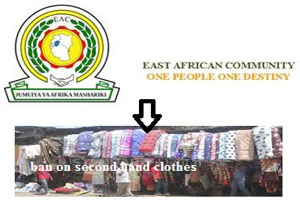
EAC to start process to impose ban on second hand clothes
YarnsandFibers News Bureau 2016-03-03 17:00:00 – AfricaOn admission of South Sudan to the EAC, East African Community (EAC) member states have agreed to start a process to impose a ban on second hand clothes. However, traders have not welcomed the decision as majority of second hand clothes, commonly known as ‘mitumba’, is a source of income to many.
Gabriel Njeru, who sells imported second hand women’s handbags, said that most of his customers are low income earners, adding that the prices are friendly. This is a good business. Traders like Njeru to face a bleak future, should the EAC leaders at the 17th Ordinary EAC Heads of State Summit in Tanzania ban second hand clothes and shoes.
It is estimated that 65,000 people work in Gikomba; Kenya’s largest open air ‘mitumba’ market. The traders said that the ban, if implemented, will affect the economic growth of the country. This is not a good idea. It will not only affect the traders but also the poor in the society.
The ban will destroy jobs created in the business and hurt millions of poor consumers, said trader Susan Gichea. Competitive World The importation of ‘mitumba’ is blamed for the collapse of the country’s textile industry.
While critics see the second hand business as a problem in the region, traders in Gikomba do not view it that way.
Ugandan President Yoweri Museveni said that the EAC integration process was important because the world is in competition. The purpose of EAC is to see how to survive in a competitive world because they are not alone in the world. Now the EAC will serve a population of 150 million
Market Intelligence
Ask for free sample Report

experience
Customer Base
dedicated team
Countries Served Worldwide









